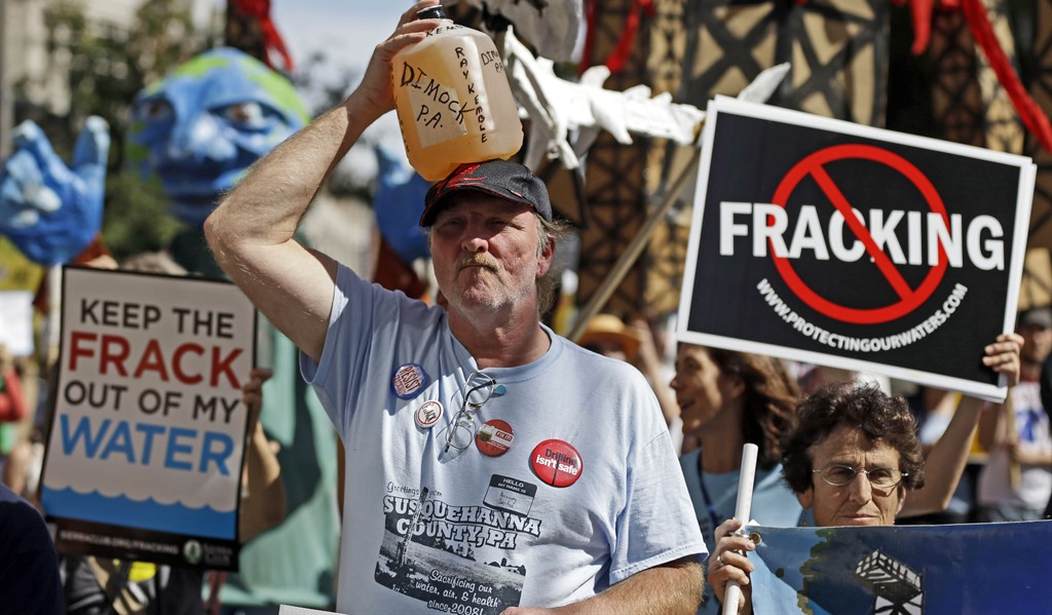When Debra Haaland snuck through confirmation (with 51 votes) to become the Secretary of the Interior, everyone who had been paying attention knew that she was going to be gunning for the oil and gas industry. That made her a valuable ally for Joe Biden, who began working to shut down pipeline construction and “pause” energy exploration on public lands within hours of being sworn in. (Unless the pipeline is owned by Russia, of course, in which case he basically finances it.) Now, with gas prices spiking dramatically and in the midst of what is quickly becoming the Biden energy crisis, Haaland’s Interior Department has released a “review” of the country’s oil and gas leasing process, in which she finds “significant shortcomings.” The timing of this was no accident, as Joe Biden had been under pressure from progressive ecowarriors to find ways to stop drilling on public lands.
Biden is using the Interior Department’s review to announce new guidelines. Unfortunately for Uncle Joe, he felt compelled to take something of a middle road in his plan. The end result is that he will still be able to cause problems for consumers and the oil and gas industry while failing to satisfy the “leave it in the ground” crowd. In other words, the President has found yet another way to tick off nearly everyone on both sides of the aisle while accomplishing virtually nothing of substance. (Associated Press)
The Biden administration on Friday recommended an overhaul of the nation’s oil and gas leasing program to limit areas available areas for energy development and raise costs for oil and gas companies to drill on public land and water.
The long-awaited report by the Interior Department stops short of recommending an end to oil and gas leasing on public lands, as many environmental groups have urged. But officials said the report would lead to a more responsible leasing process that provides a better return to U.S. taxpayers.
“Our nation faces a profound climate crisis that is impacting every American,″ Interior Secretary Deb Haaland said in a statement, adding that the new report’s recommendations will mitigate worsening climate change impacts “while staying steadfast in the pursuit of environmental justice.″
While the review does not yet specify which lands and coastal areas will be blocked off from future leases, it’s not difficult to predict the strategy that will be used to make that determination because we’ve seen this movie before. Much as was attempted during the Obama administration, they’ll want to ring up a large number of square miles to impress the liberal base. There is plenty of public land out there where the oil and gas industry has no interest in drilling to begin with because there are no useful amounts of oil under it. Much of that will make the “no drilling” list. Then there will be some areas off the coast of traditionally blue states which may or may not hold potential for energy exploration that will be tacked on the list so Democrats can claim a “victory” in that regard.
The problem for Biden is that even those measures are not going to satisfy the environmentalist crowd because nothing ever satisfies them. They want all oil and gas exploration to be shut down. As long as the black gold is still coming out of the ground at the traditional locations (such as in Pennsylvania and Texas, where a ban would be politically toxic, and offshore along the Gulf coast) Biden’s environmentalist allies will continue to give him low marks.
The other side of this convoluted coin will land in the laps of consumers of all stripes. Biden plans to increase the cost of drilling permits, supposedly as a measure to “provide a better return to U.S. taxpayers.” The first thing to remember about that is that federal revenue from oil and gas leasing is a relative pittance in terms of the total budget. They bring in less than $3 billion per year from those leases. That’s barely enough to cover all of the coffee that’s consumed in Washinton and (as sad as it may be to say) even if you doubled it, it’s not even a rounding error in the entire federal budget.
But the pinch will be felt elsewhere. When you decrease the amount of land made available to lease, the bidding for the remaining sites drives up the price. At the same time, increasing the base cost of the leases further increases the drag on the oil and gas companies’ bottom lines. Do you know what happens when the cost of locating and extracting the oil and gas goes up? They pass those increases on to consumers in the form of more expensive gasoline, heating oil and natural gas.
People are already up in arms over rising gas prices and inflation in general. This decision will only keep that trend going in the wrong direction to the detriment of the approval ratings for both Biden and the rest of his party. I’m not sure who from Team Biden cooked up this plan, but it doesn’t seem to have been well thought out in terms of either public policy or political advantage.







Join the conversation as a VIP Member